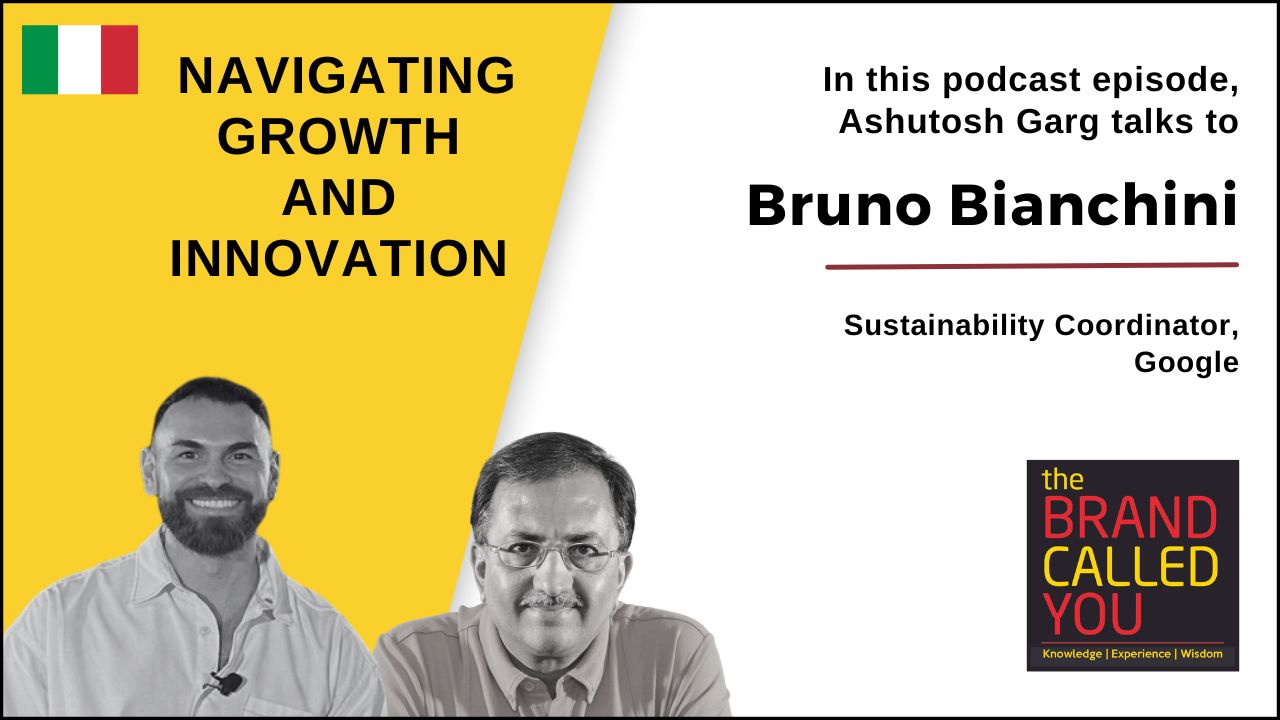Bruno Bianchini, Sustainability Coordinator, Google
- Bruno Bianchini is a sustainability coordinator with Google and a sustainability master’s student at Harvard University.
- Bruno’s helps small and medium businesses rethink their operations to cut losses and get back to profitability.
Podcast
Overview
In this episode of The Brand Called You, Bruno Bianchini, a sustainability coordinator at Google and a sustainability master’s student at Harvard University, discusses his journey and how growing up on a farm in Italy sparked his interest in sustainability. He emphasises the importance of integrating sustainability into business practices and overcoming misconceptions about sustainability, such as focusing solely on carbon emissions and thinking it’s only for large corporations. Bruno shares insights into how he supports startups and SMEs at Google through education and industry initiatives. He discusses the challenge of balancing economic growth with sustainability and the potential of biomimicry.
00:36- About Bruno Bianchini
- Bruno Bianchini is a sustainability coordinator with Google and a sustainability master’s student at Harvard University.
- Bruno’s helps small and medium businesses rethink their operations to cut losses and get back to profitability.
- Bruno worked in two different countries and led successful digital businesses in Italy and the MENA region.
00:55- What got you interested in the area of sustainability?
- My upbringing on a farm in northern Italy instilled in me an early awareness of sustainability issues, as I witnessed firsthand the interconnectedness between human activities and the natural environment.
- In 2019, my perspective on sustainability was further influenced when I encountered an environmental activist who highlighted the environmental costs associated with modern agricultural practices, such as the heavy use of fertilisers and pesticides, deforestation, and the environmental impacts of the cattle industry.
- Watching documentaries like “Cowspiracy” served as a tipping point for me, prompting me to critically examine the environmental impacts of industrial agriculture and inspiring me to advocate for more sustainable practices.
20:52- What would you say is one of the most unexpected lessons you have learned about sustainability while working with so many people?
- It’s impossible to achieve infinite economic growth on a finite planet; the world has become small for our growing economy’s demands on Earth’s resources.
- Technology helped human civilization progress but at the expense of other species (e.g. pesticides killing pollinators, fertilisers creating dead zones in oceans).
- Think about feedback loops, technology cannot be the only solution, if A impacts B, the question is how does B impact A in return
RESOURCES:
Learn more about Bruno Bianchini: LinkedIn
Enjoyed this podcast?
If you learned new insights about Sustainability, Business, and Technology, subscribe and share it with friends!
Love to give us 5 stars? ⭐⭐⭐⭐⭐ If you do, we’d love a review from you. Help us reach more people to keep them in the know as we talk to leaders, high achievers, and thought leaders from diverse backgrounds and nationalities. Excellence can come from anywhere; stay in the know, and hear from emergent high achievers and gurus.
Stay updated with what’s shaping the world today through the latest The Brand Called You Podcast episode. Follow us on iTunes, Spotify, and Anchor.fm.
You can find us at:
Website: www.tbcy.in
Instagram: http://bit.ly/3HO7N06
Facebook:http://bit.ly/3YzJOaD
Twitter: http://bit.ly/3wMBOXK
LinkedIn: https://www.linkedin.com/company/tbcy/
YouTube: http://bit.ly/3jmBqfq
Chingari: https://chingari.io/tbcypodcast
Josh: http://bit.ly/3WWP0nB
Thanks for listening!
Profile
- Bruno Bianchini is a sustainability coordinator with Google and a sustainability master’s student at Harvard University.
- Bruno’s helps small and medium businesses rethink their operations to cut losses and get back to profitability.
- Bruno worked in two different countries and led successful digital businesses in Italy and the MENA region.


